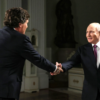
Vladimir Putin’s challenge was to tell Americans through Tucker Carlson a complicated and unfamiliar narrative of how dearly Ukrainians and Russians are paying for Putin’s initial naïve trust in the West, writes Tony Kevin.
The Pakistani leader probably sealed his fate when, at a rally, he berated the West for pressuring him to condemn Russia over Ukraine at a vote in the United Nations, writes Jeffrey Sachs.